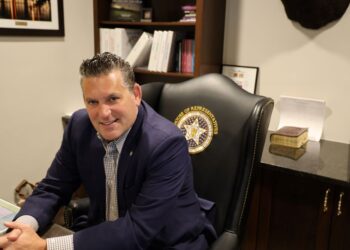OKLAHOMC CITY (OBV) – Members of Oklahoma’s law enforcement and business communities gathered at the State Capitol late last week for the first meeting of the Oklahoma Organized Retail Crime Task Force.
Senate Bill 674 established the task force to gather data and recommend to the legislature and governor solid solutions on how to combat Oklahoma’s organized retail crime problem.
Senate Pro Tempore Greg Treat hosted the task force’s first meeting, held on Oct. 26.
“There is a nationwide problem with organized retail crime and Oklahoma is no exception,” Treat said. “Our task force has a unique makeup of business executives, from both large corporations and small businesses, law enforcement and companies involved in the supply chain to help guide our discussions. My goal is to figure out the scope of the problem, where we are lacking coordination and communication and what needs to change to help businesses stay and expand in Oklahoma. There may need to be a legislative fix, or better communication and cooperation from various entities on the ground or both. Through our meetings, we will hopefully work together to stop this growing problem and make Oklahoma a more business friendly state.”
Task force members selected Jamie Bourne, Home Depot’s lead organized retail crime investigator, to chair the task force, and chose Michael Junk, Quick Trip’s manager of public and government affairs, to serve as vice chairman.
The task force’s members are as follows:
- Jared Furrh, Oklahoma City Police Department;
- Investigator Jamison Hirsch, Tulsa Police Department;
- Jim Griffith, CEO of OnCue;
- Regional Investigations Manager Robert Heck, Lowe’s;
- District Attorney Greg Mashburn, District Attorney for Cleveland, Garvin and McClain Counties;
- Captain Ron Kawano, Wagoner County Sheriff’s Office;
- Chief Wendall Franklin, Tulsa Police Department;
- Justin Wolf, Attorney General’s Office;
- Steven Potts, manager of Indian Nation Wholesale; and
- Jeff Reasor, representing the Oklahoma Grocers Association
The focus of the first meeting was organization. Future meetings will be held but dates have not yet been announced.
Retail crime is surging across the U.S.
A 2022 U.S. Chamber of Commerce survey found that 56 percent of small businesses throughout the nation reported theft during the year leading up to the survey. Also, 53 percent of the small business proprietors who participated in the survey said theft from their stores became increasingly frequent.
Retail crime ultimately hits consumer pocketbooks. Nearly half (46 percent) of the small business owners surveyed said they had to raise prices because of shoplifting. Fifty-three percent of those retailers said shoplifting occurs more frequently during the holiday season.
Theft has become a problem for small businesses across all sectors.
Almost four in 10 (37 percent) small businesses reported shoplifting or theft, with 14 percent saying they experience it on a monthly or more frequent basis. Thirty-six percent of those small business owners said they enhanced security measures to combat shoplifting or theft.
Retail crime drains astronomical amounts of money from legitimate businesses.
Around $100 billion was lost to general crime, or shrink, in the past year, while organized retail crime – crime committed by organized criminal rings – continues to worsen. U.S. Chamber officials said 26.5 percent of businesses reported an increase in organized retail theft.
“The scourge of organized retail crime has become increasingly pervasive, with retailer losses driven by retail crime totaling nearly $100 billion dollars last year,” said Tom Wickham, the U.S. Chamber’s senior vice president of State & Local Policy. “No store should have to close because of theft, but we are sadly seeing more stores – particular smaller ones – shuttering their doors because of theft and other crime in their neighborhoods.”

















